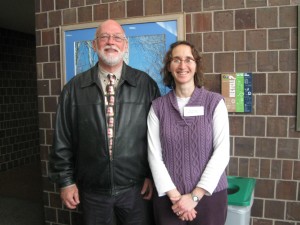University of Rochester
Sustainability @ the
University of Rochester
The University Council on Sustainability
February 2012
The mission of the Council: “The University Council on Sustainability’s mission is to conduct annual review of the University’s progress in environmental sustainability initiatives in operational and academic areas; to establish and maintain communication vehicles for conveying the University’s sustainability initiatives; and to recommend new sustainability initiatives that the University might undertake.”
The University of Rochester’s Sustainability Council was founded in 2008 by President Joel Seligman. Originally chaired by Senior Vice President for Administration and Finance Ron Paprocki and University Provost Ralph Kuncl, the Council was a small committee focused on 25 sustainability initiatives. These initiatives are in the areas of energy, waste management, recycling, purchasing, business practices, land use, building design, construction, transportation, parking, and dining services. For a full list of the initiatives read the University Council’s Report on Environmental Sustainability from 2008.
Since then, Council membership has expanded and includes faculty and staff from all areas of the University including Strong Memorial Hospital, Eastman School of Music, and Simon School of Business. To help understand the priorities and desires of the student body, student members are included as a valuable part of the Council as well. The current co-chairs are Earth and Environmental Sciences Lecturer, Karen Berger and Director of Campus Dining Services and Auxiliary Operations, Cam Schauf. Overall, the council functions as a group to discuss new ideas, provide information, and focus on the initiatives. They consider large scale discussion and interdepartmental cooperation important for positive change. Often, members from sectors who are unused to sustainable practices benefit from the advice of the Council.
After deciding on which initiatives to address, the Council breaks down into small working groups to accomplish projects. For example, the Council made the decision in Spring 2012 to participate in the STARS program. STARS is a tracking system developed by AASHE and gives ratings based a self-assessment of institution-wide sustainability practices. The council hopes that by completing STARS and obtaining a rating, it will become clear where improvements need to be made. From there, targeted initiatives and working groups can be created.
More working groups completed projects such as Eastman’s recycling effort, the development of the University sustainability website, and implementation of the outdoor recycling bins. UR Green News, a biweekly newsletter on University sustainability updates, was created out of the Council’s mission to communicate initiatives.
Going forward, a new website with more comprehensive information on academic sustainability initiatives is under development. Further direction of short- and long-term goals will come from the results of the STARS assessment previously.
By Alanna Scheinerman, Class of 2013
